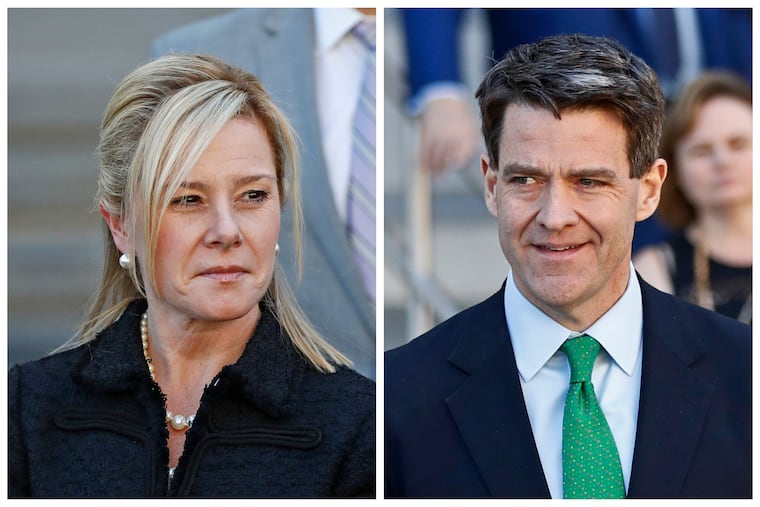Bridgegate is about to get its day at the Supreme Court
The scandal that helped sink Chris Christie's White House ambitions will be back in the spotlight when the Supreme Court considers whether onetime aides of his committed fraud when they helped execute the political retribution plot.

Chris Christie is out of office. But the scandal that helped sink his White House ambitions will be back in the spotlight Tuesday, when the U.S. Supreme Court considers whether onetime aides to the former New Jersey governor committed fraud when they helped execute the political retribution plot known as Bridgegate.
Bridget Anne Kelly, Christie’s former deputy chief of staff, and Bill Baroni, his top executive appointee at the Port Authority of New York and New Jersey, were found guilty in 2016 by a federal jury of charges including conspiracy and fraud.
The charges stemmed from their involvement in a 2013 scheme to reduce the number of access lanes available in Fort Lee, N.J., to commuters approaching the George Washington Bridge from three to one, gridlocking traffic in the town for days.
Their goal was to punish the town’s mayor for his refusal to endorse Christie’s reelection campaign, according to evidence from the trial.
The traffic jams, which began on the first day of school to maximize chaos, caused delays for everyone from schoolchildren to first responders, endangering public safety, prosecutors alleged.
The scandal erupted in January 2014 — just months after the Republican Christie won a landslide reelection in the generally blue state — when emails surfaced linking the bridge plot to the governor’s office. “Time for some traffic problems in Fort Lee,” read one August 2013 email from Kelly to Port Authority official David Wildstein. “Got it,” he replied.
In order to execute the scheme, the jury found, the defendants and Wildstein created a bogus story that they were conducting a traffic study.
That deception is central to the argument on Tuesday. At trial, Kelly and Baroni testified they believed the traffic study was legitimate.
The question before the court is essentially whether Kelly and Baroni defrauded the government of its property by lying to agency employees and others in order to use public resources for the unauthorized political payback scheme.
Attorneys for Kelly and Baroni say the precedent set by their convictions would “transform the judiciary into a Ministry of Truth for every public official in the nation.”
Each faces prison time if the high court affirms their convictions. Kelly was sentenced to 13 months after a federal appeals court upheld most of the counts, and Baroni had already served three months of his 18-month term when the justices agreed in June to hear the appeal.
» READ MORE: Bridget Kelly, sentenced to 13 months in prison, lashes out at Chris Christie: ‘You are a bully’
Wildstein, the government’s star witness, pleaded guilty and was spared prison time.
The government says Kelly and Baroni defrauded the Port Authority of the labor of more than a dozen employees, some of whom worked overtime to collect tolls and perform other unnecessary work. The defendants’ political motivations were irrelevant to the jury’s finding of guilt, the government said.
“The scheme in this case required the Port Authority to pay additional wages, redirected the value of the Port Authority’s scheduled wage payments, and divested the Port Authority of control of the George Washington Bridge, all to the benefit of Kelly and Baroni, who used those Port Authority resources to create traffic jams and a cover-up,” acting Solicitor General Jeffrey B. Wall wrote in court papers. “The scheme was effectuated by means of a lie — the claim of a traffic study that did not in fact exist — without which Baroni would not have been able to turn the agency’s resources from helping the public to harming it.”
Attorneys for Kelly and Baroni say the decision by a three-judge appeals panel for the U.S. Court of Appeals for the Third Circuit in Philadelphia would allow any public official “to be indicted on nothing more than the [ubiquitous] allegation that she lied in claiming to act in the public interest.”
“Consider a deputy mayor who orders pothole repair to reward her boss’ political base, justifying it on policy grounds,” the attorneys wrote in court papers. “Or a staffer who requests an environmental review as window-dressing to assuage a lobby group, with no intention of heeding its recommendations. Or a state cabinet secretary who appoints a friend to a post, declaring him to be the best-qualified.
“All are felons under the decision … since they engaged in spin in describing their ‘true purposes,’ and so ‘deprived’ the state of ‘property’ (the pothole repair trucks, the expense of the study, or the appointee’s salary),” they wrote.
The government says those scenarios are misplaced. “A city official who has the power to order snow removal or pothole repair generally does not need to tell her staff why she wants them to plow certain roads or fill certain potholes,” government lawyers wrote.
In contrast, the government says, Baroni lacked the authority to realign the lanes, and thus needed to lie about the supposed traffic study.